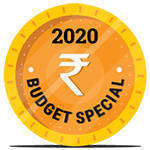 The Budget fired on two cylinders for the countryside, proposing billions of dollars for farms and a water scheme in a bid to bump up rural incomes necessary for scripting a revival of India’s consumption story.
The Budget fired on two cylinders for the countryside, proposing billions of dollars for farms and a water scheme in a bid to bump up rural incomes necessary for scripting a revival of India’s consumption story.
The measures, that came along with a new personal tax system, come as growth in fast moving consumer goods slowed down to 9.7% last year from 13.5% in 2018, according to market researcher Nielsen. Also, lower farm incomes and liquidity constraints leading to a squeeze in wholesale channels impacted rural demand, which accounts for about a third of the FMCG market and had been outstripping urban sales.
To improve farm incomes, finance minister Nirmala Sitharaman allotted Rs 2.83 trillion ($40 billion) for agriculture and rural sectors such as irrigation, and set an agricultural credit target of Rs 15 trillion.
These steps, the government hopes, will double the income of farmers in the next two years.
Announcing 16 action points for farmers, the minister said farm markets need to be liberalised and farming needs to be made more competitive.
She also said the government will spend $50.65 billion on a central water scheme in a nation where agriculture accounts for 15% of gross domestic product and provides livelihood for more than half of the country’s 1.3 billion population.
“Focused efforts to improve agricultural productivity, together with better target subsidies, are summed up in a 16-point action plan. This should relieve stress in the agrarian economy and boost rural growth prospects for FMCG,” said Vivek Gambhir, MD at Godrej Consumer Products Ltd.
Outside of farms, the government announced an optional tax system that will coexist with the current one. The new system will offer cuts for those ready to give up tax breaks.
In all, the rural push is expected to revive fortunes of FMCG and consumer durable firms, which were badly hit by lower farm income and liquidity constraints due to the slowdown in the economy.
However, certain commodities will become dearer due to a hike in taxes including cigarettes, tobacco products and medical equipment. To encourage a healthier lifestyle, the government has made agro-animal based products, tuna bait, skimmed milk, certain alcoholic beverages and soya fibre cheaper.
The government also announced a scheme to boost mobile, electronic manufacturing and semi-conductor packaging, aligning with the ‘Assemble In India’ proposal of the Economic Survey.
Another sector that gained from the Budget is education where the government promised both the options of external commercial borrowings (ECBs) and foreign direct investment (FDI). Also, online education to be offered by the top 100 institutions and employment to fresh engineers by local urban bodies are a few of the noteworthy policies proposed by the government.
“The budget also announced that certain examinations will be moved online. This is a welcome development, especially as JEE and NEET are now online as well. While this makes the examination and evaluation process more efficient, it also encourages students to prepare online for exams,” said Zishaan Hayath, CEO at ed-tech firm Toppr
Also, against the backdrop of GST rollout and demonetisation, Paresh Parekh, tax leader, consumer products and retail at EY India, welcomed a move for small retailers that increases the exemption threshold from tax audit from Rs 1 crore to Rs 5 crore.






